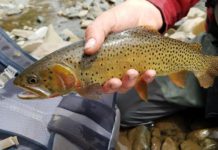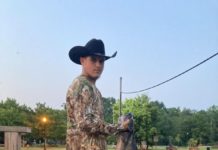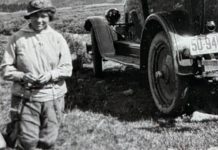ReadingRoom
The ballad of legendary poet Kevin Ireland, set on the Mataura River
The poet travels from Devonport to the far south of New Zealand a couple of times a year, to fly-fish for trout and catch up with old friends. He says he is in his 88th year, but we tell him not to exaggerate — that he is only 87. We agree on one thing though — that he can no longer spend all day standing in the river. So, we aim to fish for just a couple of hours when the autumn mayfly hatches might be at their best.
We follow the Mataura River south. Through the grim streets of the town of Mataura, and on to Wyndham. There I tell the poet I’ll show him the building that is home to The Wyndham Angling Club, one of the oldest angling clubs in New Zealand, with its small, beautiful building. However, I can’t find it, so we push on, eventually arriving at Fortrose where the river joins the Pacific.
I drive past the café and head for the cliffs overlooking the ocean, passing the windswept golf course and dark trees cowering away from the salty gales that assail this coast. Today, though, the air is warm and the grey-blue ocean smooth, apart from the giant rollers, unfurling like soil turned by a massive plough. The sky pale, indifferent.
“Have you been here before?” I ask.
“Never,” says the poet. “What a place. Look at those rollers — magnificent.”
We walk along the cliff edge where the river reaches the ocean — to mingle with all the rivers that have ever flowed. Today, though, we see the river in reverse, as the ocean pours inland, pushing plumes of sand and nutrient-rich salt water into the estuary. I point west towards the sand-spit that protects the estuary from the force of the ocean. “I started my walk up the river,” I say, “by first heading downstream along the sand-spit. I’d gone ten kilometres before I turned around and walked upstream. Spent my first night camped among those dunes, beside the last of the Mataura.”
We walk back to the car and I point towards Waipapa Point, where, back in 1881 the SS Tararua ran aground, drowning 131 passengers.
In the Fortrose Cafe, we eat seafood chowder in seats that, in any normal autumn, might be taken by foreign tourists, but on this day our fellow travellers are either New Zealanders or possibly foreigners stranded here when our borders closed. Afterwards we drive north through a band of low rolling hills, where the grass is grazed by sheep and dairy cows and the trees lose their stoop. The sky, blue earlier in the day, is covered by pewter-coloured cloud, and rain showers slide across the Hokonui Hills.
On our arrival in the late afternoon the river looks unpromising, its surface ruffled by a breeze from the south. We wait in the car, in no hurry to begin the process of pulling on our waders, erecting rods, and deciding on what fly to use. In the lee of a line of browning willows a few trout swirl in the shallows, stirring us into action. The poet chooses a nymph with a large, easily spotted, tuft of wool to indicate the take — mostly because his eyes are no longer up to following a tiny dry-fly in the tough, late-fall light. These days he likes to fish slowly, prospecting the water with patience.
“I’ll fish below you,” I say, thinking this will be the best place to keep an eye on this big man whose balance is going. A couple of years earlier, I had to haul him from the river after he slipped, while stretching to make a long cast. I thought it would be a simple task to get him back on his feet. However, the combination of his weight and the volume of water that filled his waders, together with the pull of the current, made getting him out less than a sure thing.
As we start to fish, the cool breeze dies and shafts of low sun push through a window in the cloud. The temperature rises a notch, swallows fly, and my heart lifts. I wade into the stream, stopping at thigh level, feel the nagging pull of the current through my waders, and watch the water. On a line of foam where competing currents collide, charcoal-coloured mayfly duns float for a few yards, while they ready their gauze-like wings for the flight they are compelled to take. Trout push their noses through the shining surface of the river and swallow the duns. Most make it beyond the trout though, and take to the air, where swallows swoop and lift and swoop again to catch them. I watch a trout swaying in harmony with the current, and try to place my fly on the foam line, comparing it with the real thing as though it’s an entrant in a beauty contest — and I wait, breath held, until the fly reaches the fish.
We catch several trout: fat, olive backed, three pounders. Later I will tell the poet that they looked as though they came from the sea, such was their chrome beauty. I kill one because the poet wishes to take a couple home.
“I’m sorry,” I whisper to the fish, while I watch its life-colours fade. Above the sound of the river, I hear the old poet call “I’ve just hooked another — a beauty, but it came off.” He cares less now about landing fish than when we first met thirty years ago. To hook them is enough. Besides, a lost fish is free to grow more wondrous in his imagination.
I look upstream into the setting sun and watch the poet unfurling his line over water that looks black and hard, like a flowing seam of coal. I retrieve my camera and walk towards him, saying, “Carry on, I want to get a shot of you casting. The light is extraordinary.” I click the shutter and look at the result. A shaft of light hits the poet as though he is about to be teleported to a distant planet. I try another shot, and the result is the same. I tell him I think he is about to leave us, and he laughs his big laugh.
For reasons too subtle for my senses to detect, the mayflies abruptly stop their journey to the surface. The swallows and trout disappear with the duns while the poet and I stand, for a moment, our shadows long across the river. “Look at that,” I say, pointing north to the Eyre Mountains and the wind sculpted clouds forming on their western flanks. “We started at the mouth of the river a few hours ago, and here we are, looking towards its source.”
We crunch over river gravel on our short walk back to the car. Then, “This feels a bit awkward, but I need to say it…you’re an inspiration, keeping on going. Coming back year after year to slip and slide in the river. Staying positive. I need that as a model of how to tackle the future.” He chuckles and says, “I like watching you fish — seeing you cast.” While I hope for more, I accept what he has said as enough. I admire his poetry and his stoicism. I remember the first day a friend and I fished with him — how he waited until we were climbing a steep slope at the end of the day to tell us that he couldn’t feel the sun on one side of his face. Later, when I heard what he thought was the remnants of a hangover turned out to be a brain haemorrhage, I realised he wasn’t to be trifled with.
We remove our boots and waders at the car, while the setting sun casts a lambent light across the river, fields and trees beyond.
The poet says, “What keeps me coming back are these moments of magic. The light and the river. Just being here to witness it.” Downstream I see the rings of rising trout pushing across the slick surface of the river. For a moment I think we should stay on into the dark to fish the spinner fall, but I see in the poet’s face that it is time to leave.
Later, in Balfour, with friends, we will talk of the trout and the river. Later still we will hear the conversation turn rancorous about the pandemic. It will leave the poet, myself, and a friend, stepping into a moonless night, wondering when we will be welcome back to this house in which we have experienced much joy.
For more fishing yarns, Upstream on the Mataura by Dougal Rillstone (Mary Egan Publishing, $39.99) is available in bookstores nationwide.
Credit: Source link































